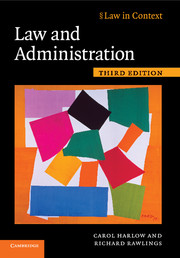Book contents
- Frontmatter
- Contents
- Preface
- Table of Cases
- Table of Statutes
- 1 Red and green light theories
- 2 The changing state
- 3 Transforming judicial review
- 4 Making the law
- 5 Rules and discretion
- 6 Regulation and governance
- 7 Regulatory design and accountability
- 8 Contractual revolution
- 9 Contract, contract, contract
- 10 Into the jungle: Complaints, grievances and disputes
- 11 Tribunals in transition
- 12 The Parliamentary Ombudsman: Firefighter or fire-watcher?
- 13 Inquiries: A costly placebo?
- 14 Continuity and change: Procedural review
- 15 Elite dimension: Court structures and process
- 16 Judicial review and administration: A tangled web
- 17 ‘Golden handshakes’: Liability and compensation
- Index
7 - Regulatory design and accountability
Published online by Cambridge University Press: 05 June 2012
- Frontmatter
- Contents
- Preface
- Table of Cases
- Table of Statutes
- 1 Red and green light theories
- 2 The changing state
- 3 Transforming judicial review
- 4 Making the law
- 5 Rules and discretion
- 6 Regulation and governance
- 7 Regulatory design and accountability
- 8 Contractual revolution
- 9 Contract, contract, contract
- 10 Into the jungle: Complaints, grievances and disputes
- 11 Tribunals in transition
- 12 The Parliamentary Ombudsman: Firefighter or fire-watcher?
- 13 Inquiries: A costly placebo?
- 14 Continuity and change: Procedural review
- 15 Elite dimension: Court structures and process
- 16 Judicial review and administration: A tangled web
- 17 ‘Golden handshakes’: Liability and compensation
- Index
Summary
As major repositories of public power, the institutional design and accountability of regulatory agencies are important matters. The more so, it may be said, in this era of ‘super-agencies’. A host of questions arises for the student of law and administration. Will the statutory framework provide sufficient guidance? Is the agency given the appropriate tools for the job? Are good governance values such as transparency properly reflected in the design? Individually and collectively are the external lines of accountability up to the task? Or are they apt to confuse (or be confused)? We see immediately that, embedded though they now are as generally accepted statements of regulatory best practice, the better regulation principles do not exhaust the field.
‘Public + private’ as well as ‘public vs private’, contemporary developments happening under the broad rubric of ‘governance’ give all this an additional twist. In what ways are self-regulatory organisations (SROs) appropriately harnessed in the public interest? How is the delegation and re-delegation of powers in a co-regulatory system properly organised? Alternatively, a problem exacerbated in the EU context, how in this challenging landscape of overlapping functions and fluid networks can the consumer interest be properly vindicated and effective lines of accountability secured? We will see serious efforts being made to match the advance in agency powers with more open and protective procedures, but this should not be allowed to obscure the underlying potential with systems of governance for ‘passing the buck’.
Information
- Type
- Chapter
- Information
- Law and Administration , pp. 282 - 337Publisher: Cambridge University PressPrint publication year: 2009
